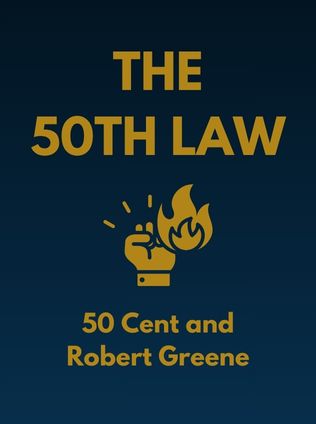
The 50th Law
By 50 Cent and Robert Greene
Published 10/2008
About the Author
Curtis "50 Cent" Jackson is not just a name in the hip-hop industry but a symbol of transformation and resilience. Born in the rough streets of Southside Queens, New York, Jackson faced a life filled with adversity from a very young age. He turned to the streets, hustling in the dangerous world of drug dealing to survive. Yet, despite the overwhelming odds against him, Jackson managed to pivot from this perilous lifestyle to become a global icon in the music industry. His debut album, Get Rich or Die Tryin', catapulted him into stardom, and his relentless work ethic and fearless attitude helped him transition into other ventures, including acting, business, and writing.
Jackson's partner in The 50th Law, Robert Greene, is a seasoned author renowned for his deep exploration of power dynamics, strategy, and human nature. Greene's earlier works, such as The 48 Laws of Power, The Art of Seduction, and The 33 Strategies of War, have established him as a thought leader in understanding and navigating the complexities of power and influence. Together, Jackson and Greene weave a narrative that is as much about survival as it is about achieving greatness, using fearlessness as the key ingredient.
Main Idea
The central thesis of The 50th Law is the transformative power of fearlessness. Jackson and Greene argue that fear is the most significant obstacle standing between an individual and their full potential. Fear manifests in various forms—fear of failure, fear of rejection, fear of loss, and fear of the unknown. According to the authors, overcoming these fears is not just beneficial but essential for anyone who wants to achieve true success and power. The "50th Law" they propose is a mindset where fear is acknowledged but never allowed to dictate actions. Instead, one must embrace challenges, adapt to changing circumstances, and boldly forge a path toward their goals, regardless of the risks involved.
Table of Contents
- Introduction: Fear Nothing
- Seeing Things for What They Are - Intense Realism
- Make Everything Your Own - Self-Reliance
- Turn Shit into Sugar - Opportunism
- Keep Moving - Calculated Momentum
- Know When to Be Bad - Aggression
- Lead from the Front - Authority
- Know the End When You Begin - Self-Awareness
- Respect the Process - Mastery
- Push Beyond Your Limits - Transcendence
- Confront Your Mortality - Acceptance of Death
Introduction: Fear Nothing
In the opening of The 50th Law, Jackson and Greene present a stark reality: most people live in a state of fear, whether they realize it or not. This fear may be subtle, lurking in the background of daily decisions, or it may be overt, paralyzing individuals at critical moments. The authors assert that the greatest fear is the fear of being oneself. People often conform to societal expectations, suppress their true desires, and live inauthentic lives to avoid the discomfort of standing out or facing rejection.
Jackson’s life story is a testament to the power of rejecting this fear. His journey from a hustler on the streets to a music mogul was marked by moments where fear could have easily led him astray. Yet, he chose to confront his fears head-on, whether it was the fear of failure, fear of death, or fear of public scrutiny. The introduction sets the stage for the book's exploration of how embracing fearlessness can lead to unparalleled success.
“The greatest fear people have is that of being themselves. They want to be 50 Cent or someone else. They do what everyone else does even if it doesn’t fit where and who they are.” – 50 Cent
Seeing Things for What They Are - Intense Realism
The first law of fearlessness introduced in the book is intense realism. Jackson and Greene argue that one of the most critical steps in overcoming fear is to see the world as it truly is, without the comforting illusions that many people cling to. This means acknowledging the harsh realities of life, including the inevitability of hardship and struggle.
Jackson’s upbringing in Southside Queens exposed him to the brutal truths of life at an early age. He learned that survival depended on recognizing and adapting to these truths rather than denying them. This realism became a cornerstone of his success. When Jackson transitioned from the streets to the music industry, he brought this pragmatic mindset with him, enabling him to navigate the cutthroat world of entertainment with a clear-eyed understanding of what it would take to succeed.
Intense realism is about more than just acknowledging external realities; it also involves an honest assessment of oneself. This includes recognizing personal strengths and weaknesses, understanding one's true desires, and accepting responsibility for one's life. Jackson and Greene emphasize that many people fail to achieve their goals because they are unwilling to confront uncomfortable truths about themselves or their situations.
Sign up for FREE and get access to 1,400+ books summaries.
You May Also Like
The Subtle Art of Not Giving a F*ck
A Counterintuitive Approach to Living a Good Life
By Mark MansonRich Dad Poor Dad
What the Rich Teach Their Kids About Money - That the Poor and Middle Class Do Not!
By Robert T. KiyosakiHow To Win Friends and Influence People
The All-Time Classic Manual Of People Skills
By Dale CarnegieFreakonomics
A Rogue Economist Explores the Hidden Side of Everything
By Steven D. Levitt and Stephen J. Dubner



















